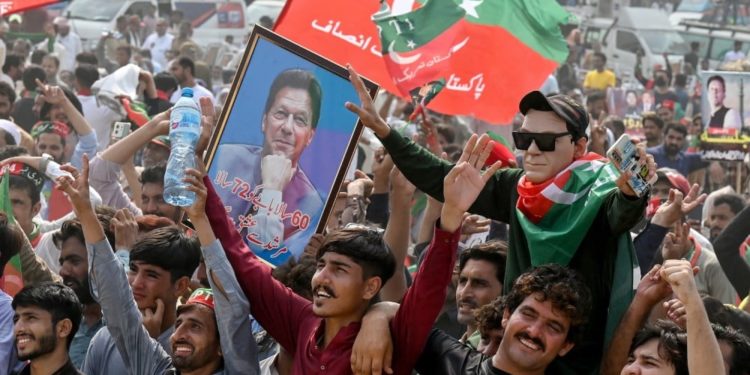Welcome to Foreign Policy’s South Asia Brief.
The highlights this week: Pakistan’s opposition sounds off against proposed amendments to the constitution, the U.S. State Department’s top Afghanistan official moves on without a replacement, and police crack down hard on protests in Bangladesh.
Sign up to receive South Asia Brief in your inbox every Wednesday.
Sign up to receive South Asia Brief in your inbox every Wednesday.
A fiery message from jailed Pakistani opposition leader Imran Khan was shared on his official X account on Monday, calling for protests across Punjab province—home to Pakistan’s military headquarters—this weekend. The provincial government quickly banned public gatherings in the areas where Khan called for demonstrations.
The message underscored a surge in tensions between Khan’s Pakistan Tehreek-e-Insaf (PTI) party and Pakistan’s civilian and military leadership—the latest chapter in a confrontation that dates to Khan’s ouster as prime minister in 2022.
This time around, the main trigger is the proposal of constitutional amendments that would increase government control over the judiciary and make it easier to ban political parties. The legislation has inflamed an opposition angered by years of government crackdowns against PTI leaders and supporters. Despite state attempts to limit protest, the PTI has continued to mobilize, albeit in smaller numbers.
After tough security measures in Rawalpindi stymied a PTI protest on Saturday, a top party leader called for a “revolution,” warning that if a single bullet is fired on PTI protesters, they would respond with 10. On Sunday, Khan was slapped with new terrorism charges related to the protest—adding to the many charges he already faces—that accuse him of incitement.
Bellicose PTI rhetoric is becoming a trend. In recent rallies, protesters have threatened to free Khan from prison by force if he is not released. Party leaders are also speaking with greater urgency, insisting that protests must continue until the government falls. On Monday, Khan’s sister Aleema Khan warned that without sustained demonstrations, Khan could be placed in military custody.
This escalation may be bluster, but it could also be an attempt to pressure the authorities to release Khan—the PTI’s core goal—or to make concessions on other issues, such as the proposed amendments.
Those in charge won’t take it lightly. The PTI challenge has proved unusually difficult for Pakistan’s powerful military: The party has successfully leveraged tools of dissent, including social media, and an increasingly politicized diaspora. Yet from the military’s standpoint, the PTI crossed a red line in May 2023, when political protesters attacked military facilities after Khan was arrested.
As a result, the military intensified its crackdown on the party, and today the army has things right where it wants them: Much of the PTI’s top leadership has been arrested or pressured to leave the party or politics altogether. Curbs on public demonstrations have largely neutralized the PTI’s street power.
Meanwhile, increasing efforts to throttle the internet—first through periodic shutdowns and social media bans and later a national firewall modeled on China’s—threaten to sap another key PTI strength: its formidable capacity to mobilize online, which helped PTI-backed independents stun the nation and win the largest number of seats in parliamentary elections this year.
Pakistan’s top security officials, including its new intelligence director who previously served as a top army disciplinarian, aren’t likely to show much mercy to protesters who heed Khan’s call and try to defy bans on demonstrations. The military is already grappling with separate protest movements in Khyber Pakhtunkhwa and Baluchistan provinces against state repression.
For Pakistan’s leaders, cutting the PTI down to size may amount to a Pyrrhic victory; the party still boasts a large support base but is running out of space to channel its many grievances peacefully. This is unsettling for the country’s social stability, especially against a backdrop of economic stress, surging terrorism, and rising public discontent about the conflict in the Middle East.
Top U.S. Afghanistan official moves on. The U.S. State Department announced on Tuesday that Tom West, the U.S. special representative for Afghanistan, has transitioned to a new role focused on sanctions policy. A statement from Secretary of State Antony Blinken did not mention a direct successor for West, suggesting that his position won’t be retained.
Instead, Afghanistan policy at the State Department will be led by three incumbents: Karen Decker, the Doha-based chief of mission to Afghanistan; Rina Amiri, the special envoy for Afghan women, girls, and human rights; and John Mark Pommersheim, the deputy assistant secretary of state for Central Asia.
West held his position for three years and previously served as deputy to his predecessor, Zalmay Khalilzad. The presumed removal of a post widely seen as the most senior Afghanistan position at the State Department underscores just how much the U.S. policy focus on Afghanistan has receded since the U.S. withdrawal in August 2021.
Other U.S. agencies remain engaged on Afghanistan: The U.S. Agency for International Development is providing humanitarian aid, and the Defense Department devotes significant attention to the growing threat posed by the Afghanistan-based Islamic State-Khorasan. But the State Department has led on key elements of U.S. policy, including how to engage with the Taliban and advocacy for detained U.S. citizens.
New IMF package for Pakistan. The International Monetary Fund (IMF) announced last Friday that its executive board approved a three-year, $7 billion financing package for Pakistan—including an immediate disbursement of $1 billion. The statement praised Pakistan for surges in economic growth, decreases in inflation, and replenished foreign reserves.
The deal gives Pakistan’s government something to celebrate, but like other IMF agreements with Pakistan, it isn’t exactly a political boon. It will require austerity measures that could hit the public hard, especially with rising poverty levels in recent years; the cost of living in Pakistan is now the highest in Asia.
Recent economic stabilization in Pakistan—as in nearby Sri Lanka—hasn’t translated to relief for a critical mass of the public. The government, which already isn’t popular, could eventually be hit with fresh waves of public ire.
Protests turn violent in Bangladesh. Police cracked down violently on protests in Bangladesh on Monday after thousands of people—most of them workers and activists—took to the streets calling for higher wages and better job opportunities. One person died and around 30 people were injured after police opened fire.
This is a delicate matter for Bangladesh’s interim government. The mass movement that ousted then-Prime Minister Sheikh Hasina in August has provoked a wave of wider activism—much of it fueled by economic stress. The police led a brutal crackdown against peaceful protests this summer and were met with retaliatory violence in the days after Hasina fled the country.
Many police officers, citing safety concerns, went on strike before reporting back to work on Aug. 12. Bangladesh’s interim government is keen to demonstrate its commitment to a gentler form of governance, but it is also under pressure from the public and the business community to restore law and order.
Amid closely watched elections in Indian-administered Kashmir—with results to be announced on Oct. 8—upcoming polls in the state of Haryana on Saturday have been easy to overlook. But there is a lot at stake, with Prime Minister Narendra Modi’s Bharatiya Janata Party (BJP) seeking to become the first to rule the northern breadbasket state for three consecutive terms.
In that sense, the Haryana elections, much like those in Kashmir, are an important test for the BJP following its less-than-stellar performance in national elections this year. Victory in Haryana won’t be easy for Modi’s party, though. BJP candidates fared poorly in the state in this year’s national elections, despite the party winning convincingly in Haryana in the 2014 and 2019 elections.
India Today reports that the BJP is campaigning aggressively in rural areas, where the opposition Indian National Congress party made major inroads this year. It also hopes to capitalize on infighting within the Congress party ranks in Haryana.
In the New Indian Express, scholar Shiv Visvanathan writes about the legacy of Mahatma Gandhi, whose birthday is on Wednesday. “One mistake several in the current generation make is to think that Gandhi is outdated. It is Gandhians who need to come up with new experiments, new books, new explorations—to renew the idea of India as a plural civilisation,” he argues.
In the Daily Star, economist Tasneem Raihan discusses how Bangladesh can recover the estimated $100 billion that has been laundered abroad in the last 15 years. “If Bangladesh is serious about bringing back the laundered wealth, it can learn from the experiences of countries like Malaysia, the Philippines, and most notably, Nigeria,” he writes.
In Nepali Times, writer Pratibha Tuladhar praises the recent publication of four children’s books on Nepali women. “The common thread that binds the four books is the determination and strength of character of all the four women featured. The text is replete with anecdotes of inner strength that helped them forge unique paths,” she writes.
The post Imran Khan Calls for Renewed Protest in Pakistan appeared first on Foreign Policy.



















